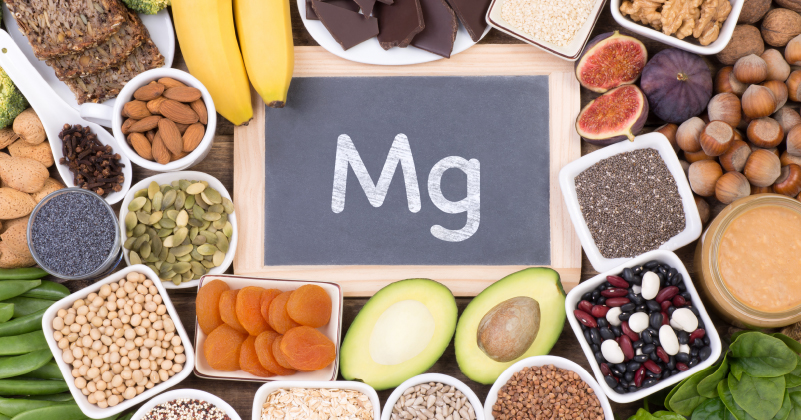
What Is Magnesium?
Magnesium is the 4th most abundant mineral in your body (after calcium, phosphorus, and sulfur); about 60% of that is located in your bones, with the rest in your muscles and soft tissues.
All that magnesium does a lot of work. It’s a key co-factor (“helper molecule”) in more than 600 vital biochemical reactions and transport activities, from energy production, nervous system function, and electrolyte/fluid balance to mood, glucose metabolism, and muscle activity—including the heart.
Yet magnesium deficiency is startlingly common in the US—researchers estimate that 50%-90% of American adults are deficient to some degree, especially women, African-Americans, and seniors.
Critical Benefits
Magnesium is used throughout your body:
- Energy: Helps the mitochondria synthesize ATP, your body’s energy molecule. A mild shortage here can lead to overall fatigue—but in extreme deficiency, lack of ATP means that cells can literally run out of energy and die.
- Brain: Helps regulate the brain receptors responsible for healthy brain development, memory, and learning. Magnesium supports healthy neuroplasticity (the brain’s ability to respond to new situations and form new connections), especially among seniors.
- Muscles: Necessary for your muscles to contract and relax smoothly. It supports athletic performance by moving glucose into your muscles quickly and removing of lactic acid efficiently. Insufficient magnesium can lead to discomfort, stiffness, cramping, and spasms.
- Heart: Regulates the heart muscle to help maintain a steady rhythm. It works with calcium to regulate blood pressure and cholesterol production.
- Bones: Plays a critical role in developing healthy bones, maintaining bone density, and guarding against bone loss. It helps your body use bone-building nutrients, including calcium and vitamin D. Low magnesium can contribute to lower bone mineral density.
- Mood: Modulates the balance between calming neurotransmitter GABA and excitatory neurotransmitter glutamate, helping to promote relaxation and even improve sleep.
- Thyroid: Essential for the production of thyroid hormones.
- Gut: Helps neutralize excess stomach acid and support regularity in the gastrointestinal tract.
- Sleep: Helps balance GABA to support deep, restorative sleep. Research has shown that supplemental magnesium can help improve sleep quality.
- Blood sugar: Regulates blood sugar metabolism.
- Vitamin D: Appears to regulate levels of this important vitamin, which in turn manages other minerals, including calcium and phosphorus. Researchers have observed that magnesium can raise vitamin D levels in people who need more, and lower levels in people who have too much.
How to Get the Magnesium You Need
Magnesium is absorbed in your small intestine, and then stored in your cells for ready use; any excess is excreted in your urine.
To maintain optimal levels, you need a regular supply of magnesium in your diet. Think fiber—in food, fiber-rich and magnesium-rich go together. Look for:
- Organ meats
- Seafood, like salmon, halibut, mackerel
- Dark leafy greens, like spinach, Swiss chard
- Broccoli, Brussels sprouts
- Beans, like black beans, mung beans
- Tofu
- Quinoa
- Avocado
- Figs
- Bananas
- Nuts, like cashews, almonds
- Seeds, like flax, sunflower, pumpkin, sesame
- Unprocessed whole grains
- Dark chocolate (70%-85% cocoa)
- Kefir
- Coffee
Taking a magnesium supplement can be another good way to get your magnesium. There’s no “best” time to take it, though if you want to capitalize on magnesium’s calming effects, you could take it right before bed. If you’re taking a prescription medication—especially antibiotics, diuretics, or for blood pressure—check with your healthcare professional before you start a magnesium supplement.
Resources
Magnesium is a rock-star mineral in your body. Find out more from the sources we consulted for this article.
C Dupont, et al., “Efficacy and Safety of a Magnesium Sulfate-Rich Natural Mineral Water for Patients with Functional Constipation,” Clinical Gastroenterology and Hepatology 12(8), Aug. 2014. Accessed 1/28/19.
Center for Magnesium Education & Research, “Why Magnesium Is Important & How It Works: A Look Under the Microscope,” undated. Accessed 1/28/19.
Franziska Spritzler, “10 Evidence-Based Health Benefits of Magnesium,” Healthline.com, 9/3/18. Accessed 1/28/19.
Neil Lava, “Reasons You May Have Brain Fog,” WebMD.com, 12/4/18. Accessed 1/28/19.
Qi Dai, et al., “Magnesium Status and Supplementation Influence Vitamin D Status and Metabolism: Results from a Randomized Trial,” American Journal of Clinical Nutrition 108(6), Dec. 2018. Accessed 1/28/19.
Ryan Raman, “What Does Magnesium Do for Your Body?” Healthline.com, 6/9/18. Accessed 1/28/19.
Valencia Higuera, “6 Possible Causes of Brain Fog,” Healthline.com, 6/14/17. Accessed 1/28/19.
WebMD, “Magnesium,” undated. Accessed 1/28/19.
William Cole, “Magnesium Supplements: Everything You Need to Know About Deficiency, Supplements, Foods & More,” MindBodyGreen.com, undated. Accessed 1/28/19.









